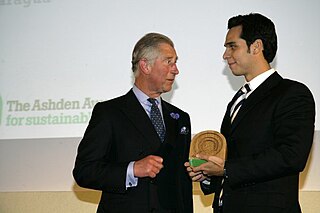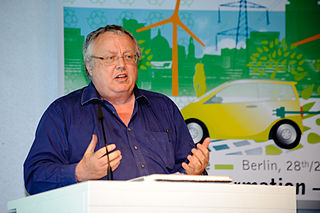
Stop Climate Chaos is a coalition of non-governmental organizations (NGOs) in the United Kingdom that focuses on climate change. It was established in September 2005 and is known for running the "I Count" campaign from 2006 to 2007. In addition, the coalition organized 'The Wave" on 5 December 2009 as a lead-up to the UN talks in Copenhagen.

Ashden is a London-based charity that works in the field of sustainable energy and development. Its work includes the annual Ashden Awards, advocacy and research in the field of sustainable energy, and mentoring and practical support for award winners.

Stephen Hale OBE is the Chief Architect of Climate Catalyst, a new organisation established in March 2021 to accelerate action on climate change through building diverse coalitions of businesses, investors, civil society groups and other champions of climate action to influence national governments.
Green conservatism is a combination of conservatism with environmentalism. Environmental concern has been voiced by both conservative politicians and philosophers throughout the history of conservatism. One of the most prominent early philosophers of conservatism, Edmund Burke, in his Reflections on the Revolution in France (1790), argued: "The earth, the kind and equal mother of all ought not to be monopolised to foster the pride and luxury of any men."

Tom Burke CBE is a co-founder of E3G, Third Generation Environmentalism and currently chairs its Board. He is also a visiting Honorary Professor of Imperial and University Colleges, London and a Senior Associate of Cambridge Institute for Sustainability Leadership (CISL). He has a long track record of experience with international environmental organisations working with and for both non-governmental and official bodies.
The Conservation Council of South Australia, also known as Conservation SA and Conservation Council SA, is an environmental organisation serving as a peak body, representing over 50 member groups, representing over 90,000 individual members, in the state of South Australia.

Beginning as a conservation movement, the environmental movement in Australia was the first in the world to become a political movement. Australia is home to United Tasmania Group, the world's first green party.
The Global Climate Network (GCN) is an alliance of influential think tanks and research institutes in different countries that collaborate on research into climate change policy and whose stated aim is to help address the political blockages to ambitious action to tackle global warming.
In political ecology and environmental policy, climate governance is the diplomacy, mechanisms and response measures "aimed at steering social systems towards preventing, mitigating or adapting to the risks posed by climate change". A definitive interpretation is complicated by the wide range of political and social science traditions that are engaged in conceiving and analysing climate governance at different levels and across different arenas. In academia, climate governance has become the concern of geographers, anthropologists, economists and business studies scholars.
The Transition Decade is a non-partisan shared campaign which is coordinated by an alliance of Australian community, social, and environmental groups, non-profits and NGOs. The initiative forms a unified plan to campaign, lobby and work to restore safe climate conditions and a sustainable future.
The reduction of carbon emissions, along with other greenhouse gases (GHGs), has become a vitally important task of international, national and local actors. If we understand governance as the creation of “conditions for ordered rule and collective action” then, given the fact that the reduction of carbon emissions will require concerted collective action, it follows that the governance of carbon will be of paramount concern. We have seen numerous international conferences over the past 20 years tasked with finding a way of facilitating this, and while international agreements have been infamously difficult to reach, action at the national level has been much more effective. In the UK, the Climate Change Act 2008 committed the government to meeting significant carbon reduction targets. In England, these carbon emissions are governed using numerous different instruments, which involve a variety of actors. While it has been argued by authors like Rhodes that there has been a “hollowing out” of the nation state, and that governments have lost their capabilities to govern to a variety of non-state actors and the European Union, the case of carbon governance in England actually runs counter to this. The government body responsible for the task, the Department of Energy and Climate Change (DECC), is the “main external dynamic” behind governing actions in this area, and “rather than hollowing out central co-ordination”. The department may rely on other bodies to deliver its desired outcomes, but it is still ultimately responsible for the imposition of the rules and regulations that “steer (carbon) governmental action at the national level”. It is therefore evident that carbon governance in England is hierarchical in nature, in that “legislative decisions and executive decisions” are the main dynamic behind carbon governance action. This does not deny the existence of a network of bodies around DECC who are part of the process, but they are supplementary actors who are steered by central decisions. This article focuses on carbon governance in England as the other countries of the UK all have devolved assemblies who are responsible for the governance of carbon emissions in their respective countries.
Left Unity is a left-wing political party in the United Kingdom founded in 2013 when film director and social campaigner Ken Loach appealed for a new party to replace the Labour Party. More than 10,000 people supported Loach's appeal.

The 2019 United Kingdom general election was held on Thursday 12 December 2019 with 47,074,800 registered voters entitled to vote to elect members of the House of Commons. The governing Conservative Party won a landslide victory with a majority of 80 seats, a net gain of 48, on 43.6% of the popular vote, the highest percentage for any party since the 1979 general election, though with a narrower popular vote margin than that achieved by Labour over the Conservatives in 1997.
E3G is a climate change think tank operating to accelerate a global transition to a low-carbon future. The organisation has staff based in Brussels, Berlin, London and Washington, D.C..
Michael Jacobs is an English economist. He is a professorial research fellow at the Sheffield Political Economy Research Institute at the University of Sheffield. He was previously a special adviser to former UK Prime Minister Gordon Brown, Co-Editor of The Political Quarterly, in charge of the full-time staff of five at the Fabian Society, director of the Commission on Economic Justice at the Institute for Public Policy Research and a visiting professor in the Department of Political Science and School of Public Policy, University College London.
A progressive alliance in the UK is the idea of a cross-party political alliance supporting "progressive politics", generally in opposition to right-wing parties, chiefly the Conservative Party.

55 Tufton Street is a four-storey Georgian-era townhouse on historic Tufton Street, in Westminster, London, owned by businessman Richard Smith. Since the 2010s the building has hosted a network of libertarian lobby groups and think tanks related to pro-Brexit, climate science denial and other fossil-fuel lobby groups. Some of the organisations it houses have close connections with those at 57 Tufton Street next door, including the Centre for Policy Studies and CapX.
The Climate and Nature Bill, formerly promoted as the Climate and Ecology Bill, is a private member's bill before the Parliament of the United Kingdom aimed at tackling the climate crisis and environmental disaster.
Rebecca Willis is a professor in energy and climate governance at the University of Lancaster in the UK. She researches on the environment and sustainability policy.







